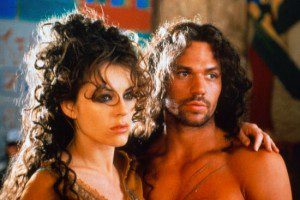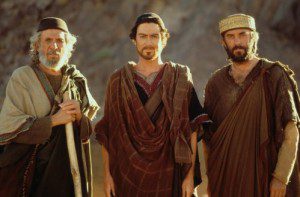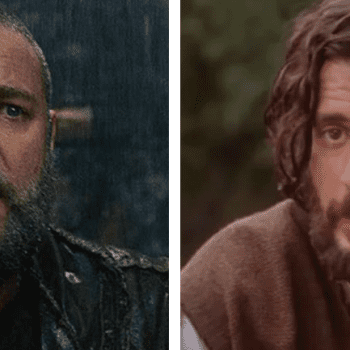 • Samson and Delilah, Warner Alliance, 1996, dir. Nicolas Roeg.
• Samson and Delilah, Warner Alliance, 1996, dir. Nicolas Roeg.
• David, Warner Alliance, 1997, dir. Robert Markowitz.
THE BIBLE Collection was, and is, a great idea, but like so many great ideas, its execution has proved rather uneven.
The initial films in this made-for-TV series — Abraham, Jacob and especially Joseph — treated biblical sex and violence with uncommon frankness, and they brought to life biblical stories that had, until then, languished in cinematic obscurity. Moses covered more familiar territory, but its down-to-earth naturalism and a terrific performance by Ben Kingsley helped to set it apart from the overblown epics of the past.
The Bible Collection’s best asset was its depiction of previously unfilmed Bible stories, and you would think the seldom-lensed stories of Joshua, the various Judges and Ruth would be ripe for the telling.
But the producers of this series have lowered their sights and produced two videos — Samson and Delilah and David — that recycle oft-told tales and are aimed squarely at the middle brow.
It may be no accident that the Israelites in these films spend so much time doing battle with Philistines.
Samson and Delilah
Easily the most unusual pedigree of any film so far in this series. It stars former James Bond girl Diana Rigg as Samson’s mother and current Austin Powers girl Elizabeth Hurley as Delilah. Easy-Rider-turned-Republican Dennis Hopper plays a Philistine general, while Eric Thal, a bland hunk with hair no longer than Hurley’s, plays Samson.
Most peculiar of all, it is directed by Nicolas Roeg, who made a name for himself in the 1970s with such trippy, mind-altering films as Walkabout and the David Bowie vehicle The Man Who Fell to Earth.
Isolated moments in Samson and Delilah hint at Roeg’s near-psychedelic knack for striking imagery, such as when the angel appears to Rigg and announces Samson’s impending birth. But for the most part, this is by-the-numbers show-up-on-set-and-cash-your-paycheque stuff, with just a hint or two of the Bionic Man during Samson’s muscle-flexing bits.
It doesn’t help that the script — which contains such clunkers as “revenge is not the only cold dish on which I have supped” — goes out of its way to puff the story, which takes a mere four chapters in the Bible, up to three hours.
Among the plot-filling devices is one subplot in which Delilah, following her fling with Samson, changes from a cold and heartless woman to a creature of genuine emotion. This is unnecessarily clichéd, since their relationship is so brief and ill-defined that it’s impossible to see why Delilah would have a change of heart.
The script also tries to shoehorn new messages into the Samson story that don’t quite fit. Blinded and chained as a prisoner of the Philistines, Samson says, “It has taken me a lifetime to understand God is the God of forgiveness.” He then proceeds to knock over the pillars and crush everyone in the room.
It also doesn’t help that the video has been “specially edited for family viewing.” Presumably the broadcast version showed a little more of Hurley, or whoever, than some would deem acceptable for a Bible story. But why? Past episodes didn’t bother covering up the libidos of their various Bible characters, nor should this one.
David
David, on the other hand, lets everyone’s sins hang out to dry, but it suffers from its own problems with length and pacing. This time, the three-hour format must encompass three entire books of the Bible (I and II Samuel and I Chronicles), and it is hacked into itty bitty pieces by the most obtrusive use of commercial breaks this series has seen yet.
Part of the problem is that, for sheer dramatic conflict, the story of David is nowhere near as interesting as the life and death of his predecessor, King Saul.
 The story of how God chose, and then rejected, Saul is particularly distracting here because it involves the film’s two best actors: Jonathan Pryce, who also played the latest James Bond villain in Tomorrow Never Dies, as Saul, and Leonard Nimoy as the prophet Samuel. (Watching Nimoy, an outspoken Greenpeacer, slay the Amalekite king and demand the death of all his cattle is a bit disconcerting, actually.)
The story of how God chose, and then rejected, Saul is particularly distracting here because it involves the film’s two best actors: Jonathan Pryce, who also played the latest James Bond villain in Tomorrow Never Dies, as Saul, and Leonard Nimoy as the prophet Samuel. (Watching Nimoy, an outspoken Greenpeacer, slay the Amalekite king and demand the death of all his cattle is a bit disconcerting, actually.)
However, both of these characters are dead well before the end of Part One. That leaves Part Two to deal with David’s family life — rape, murder, the usual dysfunctions — and none of it is all that interesting.
The biggest flaw here can probably be traced to the film’s teeny budget. David’s family troubles only make sense against the wars and battles in which he was constantly engaged; a family crisis for him could have meant the defeat of an entire nation. But none of these larger conflicts make it to the screen.
Uriah is killed when he goes for a swim, not, as the Bible has it, while attacking a city gate. And the battles in which Saul and Absalom lose their lives seem rather trivial, partly because the film never addresses the larger sociopolitical forces at work in David’s kingdom.
To see this film, you would think everybody took up arms and risked death simply because David and Absalom didn’t get along, or whatever. Without context, it’s hard to see why any of these squabbles matter.
Nathaniel Parker is alright as David, but his British accent feels too assured, too upper-class for one who was raised a low-class shepherd. Sheryl Lee, who played Laura Palmer in Twin Peaks, trembles and cries her way through the part of Bathsheba, but never really brings her to life.
The music, at least, is among the best composed for any film in The Bible Collection. But the dialogue suffers from a play-it-safe stiffness that undermines the Bible’s realism, as when Saul yells at his son Jonathan, “The mother that bore you was foul and rebellious!” Does anyone really say this sort of thing in the heat of anger? The Living Bible’s paraphrase — “You son of a bitch!” — would have been more to the point.
But perhaps I make these films sound worse than they are. They’re both better than Abraham, which meandered all over the place, and Jacob, which suffered from really bad acting. But they never reach the heights scaled by Joseph and Moses, nor do they make much of an effort to do so.
Where to go from here? The Bible Collection could tell the stories of Solomon, Elijah, Elisha or any of a host of characters who lived through the Babylonian Exile. These neglected stories are crying out for a film adaptation or two. But instead, the producers of this series have announced plans to make yet another movie about Jesus.
For now, their game plan seems to be: Play it safe. It’s a pity, since each new film in this series could have been a revelation.
— A version of this review first appeared in BC Christian News.












